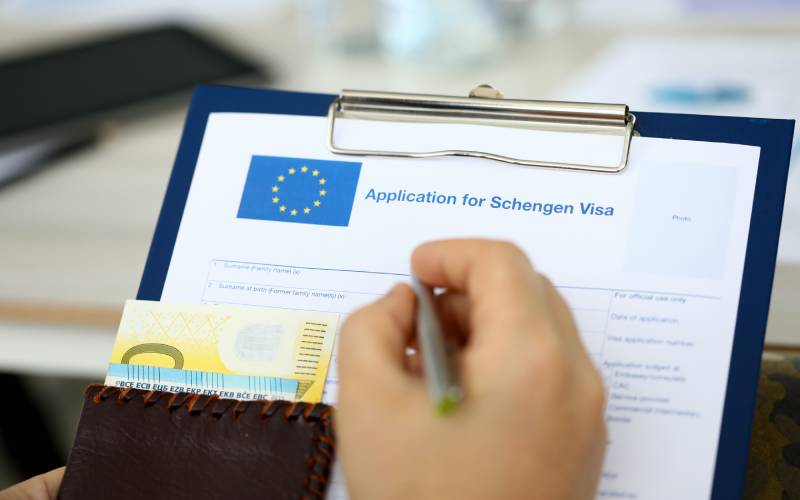Greece is one of the dream destinations for tourists around the world; however, before you book your Greece trip, you need to make sure that you have a Greece visa and how to get one. This guide explains the Greece visa requirements, details the Schengen visit visa process, and offers tips for completing a successful application.
Do You Need a Visa to Visit Greece?
Whether you need a visa or not will depend on your nationality and reason for visiting. Greece is a member of the Schengen Area, and citizens of Schengen member states and visa-exempt countries do not need a visa for short stays.
If you’re from a country that requires a visa, though, you have to apply for a Schengen visit visa to enter Greece. Tourist, family visit, or business visas are available for stays of up to 90 days within a 180-day period.

Required Documents for Greece Visa
If you are planning to travel to Greece and need a visa, you will need to prepare certain documents and meet specific requirements. Here’s a breakdown of what you will need:
Visa Application Form
- Complete the form, making sure you fill the required fields. Mismatch may cause delay or rejection.
Passport
- Validity for a minimum of three months after your planned arrival in Greece.
- It must have a minimum of two empty pages for visa stamps.
- A copy of previous visas is also required if this applies.
Photographs
- Attach two copies of passport-size photographs (35 mm x 45 mm).
- The photo should comply with certain standards, with the person presenting a neutral facial expression and head covering only for religious reasons.
Travel Insurance
- Show evidence of visiting medical insurance to at least 30,000 Euros.
- Insurance must be valid across all Schengen countries covering emergencies like accidents or repatriation.
Proof of Accommodation
- If you’re staying at a hotel, show proof of confirmed booking details.
- When visiting friends or family, you will need your host’s invitation letter and proof of their home in Greece.
Travel Itinerary
- Show them your tickets or booking confirmations for flights.
- Showing a day-by-day itinerary of what you will be doing in Greece will help your application.
Proof of Financial Means
- Recent bank statements, pay slips, or proof of sponsorship should be submitted to show you can afford your stay.
- As a general rule, €50-60 per day for a single traveler is usually more than enough.
Purpose of Visit Documentation
- Travelers must provide information such as travel itineraries and hotel reservations.
- For business purposes, you must submit a formal invitation issued by any Greek company and a letter of correspondence with that company.
How to Apply for a Schengen Visit Visa for Greece
Here is a step-by-step process to help you out with a Schengen visit visa for your Greece visit:
-
Check Your Eligibility
- Does your nationality require a visa to enter Greece? If you’re from a visa-exempt country, you can travel visa-free for visits of up to a few months, depending on nationality.
- Check that your specific eligibility and travel intentions are in line with Schengen visa criteria.
-
Gather Required Documents
- See above for the full list of documents. Ensure all paperwork is filled out correctly and is consistent with your application.
- You’ll be delayed or worse, rejected, if your submission is incomplete.
-
Schedule an Appointment
- Be ready as your visa application center schedule appointment.
- Appointment slots can fill up quickly during peak travel times, so it’s best to plan.
-
Attend the Visa Appointment
- Show up to your appointment with all necessary paperwork in hand.
- As part of your Schengen application procedure, you must submit your biometric data, such as fingerprints and a digital photo.
-
Pay the Visa Fee
- The Schengen visa application fee is €80 for adults and €40 for children 6-12.
- Acceptable payment methods differ from place to place, so check in advance. Some categories, like students or researchers, are eligible for reduced fees or are exempted.
-
Await Processing
- The normal Schengen visa processing time is usually between 10 and 15 working days, although this may take longer in peak travel season or when additional documentation is required.
- You will be contacted once your application has been processed, so be sure to provide accurate contact information.
-
Collect Your Visa
- Once approved, you can pick up your visa from the consulate or visa center that you applied to.
- Double-check everything on the visa to ensure no mistakes could affect your travel plans.
-
Plan Your Trip
- Now that you have your visa, you can book your journey to explore Greece’s beautiful scenery, incredible history, and lively culture.

Things to do in Greece
Once you’ve secured your visa, you’re all set for the tour. From stunning landscapes to cultural excursions, these are the best things to do in Greece:
- Visit Athens: Explore historical sites, including the Acropolis and Parthenon.
- Island Hopping: Mykonos for the nightlife, Santorini for the sunsets, and Crete for the history.
- Relax on Beaches: You’ll find turquoise waters at Navagio Beach in Zakynthos and Elafonissi Beach in Crete.
- Try Food: Try moussaka, souvlaki, and baklava.
- Hiking Mount Olympus: It’s a must-do activity for adventurous souls and those seeking the heart of Greece’s mythology.

Airports in Greece and Connectivity
Greece is easy to get around in with a well-connected air traffic network. Some of the major airports in Greece are:
- Athens International Airport (ATH) is the primary airport, providing both international and domestic flights.
- Thessaloniki Airport (SKG): Best for Northern Greece
- Santorini Airport (JTR): Serves new islands and foreigners.
- Mykonos Airport (JMK): Ideal for tour groups seeking the Aegean party scene.
Island and mainland destinations are easy to reach with cheap internal flights.

Places to Visit in Greece
You haven’t been to Greece until you have done a little sightseeing. Here are some places to visit in Greece:
- Santorini: Iconic white-washed homes, black-sand beaches, and luxury accommodations.
- Meteora: Magnificent monasteries sitting on stone mountains.
- Rhodes: Soaked in medieval history, including the Palace of the Grand Master.
- Crete: Greece’s largest island is home to the ancient Minoan Palace of Knossos.
Whether interested in history, nature, or cuisine, Greece offers something for every traveler.

Tips for a Successful Visa Application
- Apply Early: Do not wait until a day before your travel; try to apply at least three weeks in advance of your desired travel date.
- Be Accurate: All information should be the same in documents.
- Interviews: Go prepared to explain your reason for travel.
- Follow-up: If your application status is available online, track it.
Conclusion
Greece is considered a dream country for many travelers, and for obvious reasons: it is the perfect blend of history, culture, and nature. The good news is that with the right preparation and planning, the visa process becomes relatively easy, so you can enjoy looking ahead to the fabulous experiences that await you! Greece’s ancient ruins are breathtaking, and with its mesmerizing islands, you’re sure to have trips of a lifetime. So, finalize your travel plans and take the first step of creating lifetime memories.

